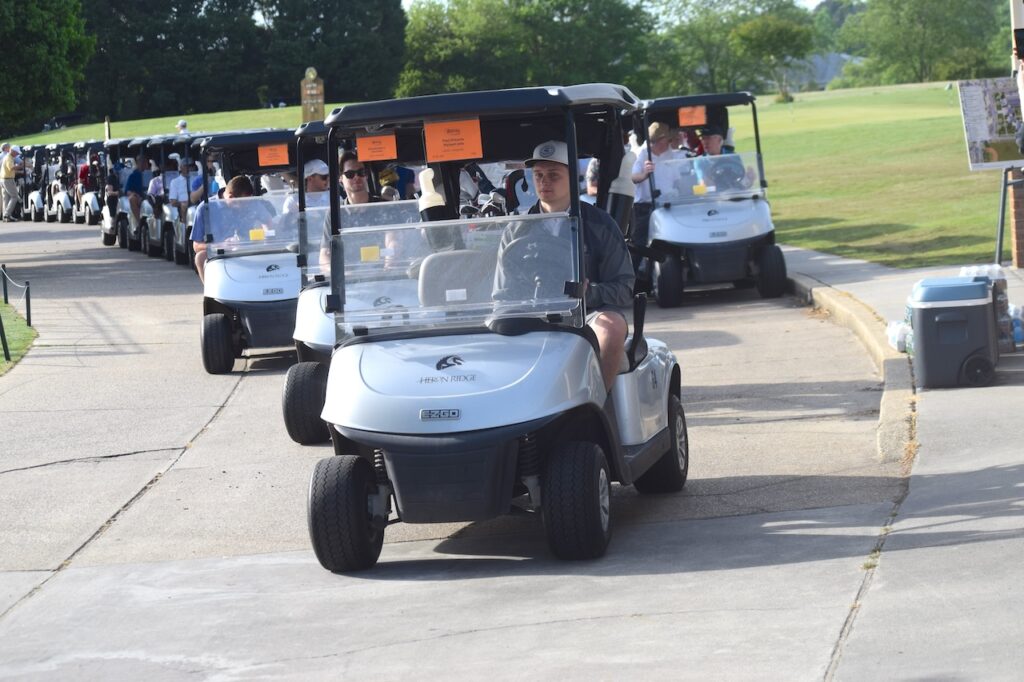The sixth annual Catholic Cup golf tournament resulted in a hole-in-one for awareness of children’s need for mental healthcare, while also raising awareness of two Catholic organizations that provide it: Catholic Charities of Eastern Virginia (CCEVA) and the Barry Robinson Center in Norfolk.
The organizations hosted the event May 3 at Heron Ridge Golf Course in Virginia Beach, raising approximately $57,000, which will be used for mental healthcare for children.
CCEVA, which provides outpatient marriage, family and individual counseling, provided 2,300 hours of counseling – 1,200 of which were for children – in 2023. Counseling is offered at CCEVA’s Newport News and Virginia Beach offices; Our Lady of Mount Carmel School, Newport News; St. Mary Star of the Sea School, Hampton; and Portsmouth Catholic Regional School, Portsmouth.
The proceeds from the tournament will help subsidize a portion of the costs of nearly 1,600 mental health sessions for youth. Insurance is not billed, so individuals are treated on a sliding-fee scale, explained Tracy Fick, the CEO of CCEVA.
The 72-bed Barry Robinson Center (BRC) is a residential mental health program which currently serves about 115 youth a year on a 32-acre campus on the border of Norfolk and Virginia Beach. It provides emotional and behavioral healthcare to military-connected children; that is, children whose parents either currently serve in the military or have retired from it. The center accepts TRICARE, the health insurance for military members and their families, said Robert McCartney, CEO of the James Barry Robinson Institute.
The institute provides foster care services, operates BRC and provides a substance abuse outpatient program for youth and young adults. It started as a Catholic middle school, but its services morphed into the multiple services it provides today.
Both organizations were created in the early 1930s. Originally, CCEVA was a service for widows and abandoned children, Fick said. Today, in addition to addressing mental health, CCEVA serves about 8,000 families annually through its adoption and post-adoption services, financial and housing counseling programs, guardianship and representative payee services, health and community services, and family engagement services.
Fick said CCEVA provides “solution-based therapy” for problems such as depression, anxiety and eating disorders.
BRC treats anxiety, depression and co-occurring substance abuse issues. The average length of stay there is five to six months. It helps military-connected youth, primarily between the ages of 11 and 17, for whom traditional mental healthcare, including former admissions to acute-care psychiatric hospitals, have failed.
Between 90% and 95% of the youth at BRC live within a four-hour drive, but the center accepts military children from anywhere. They have come from more than three dozen states, as well as from families stationed in Europe, Asia and elsewhere. McCartney said he is open to helping children from militaries of other countries as well.
Military children have a unique set of struggles as they deal with their parents’ deployments, which can involve wars and other conflicts. Military families also move frequently: the average military child could go to nine different schools during his or her parent’s 20-year career, which means adjusting to new schedules, following new curricula, and making and leaving new friends, McCartney explained.
“For some of the kids, they embrace and do well, but for a lot of kids, they struggle,” McCartney said.
Plus, they face the same struggles as many other children. McCartney said that since 2010, there has been a marked increase in depression and anxiety among children. Emergency rooms around the country are treating more children who have attempted suicide, are self-harming or have eating disorders.
“The trends parallel the use of smart phones and social media,” said McCartney.
As Fick explained, social media may have created a “whole new wave” of people, especially children, who do not have the human connection they need and develop misperceptions of the world.
“[Relationships] have been taken out of the here and now … [which] creates a whole host of issues,” said Fick. “All they see is what is being posted as the perfect life, and so somehow, they believe they can’t measure up.”
On average, children at BRC receive individual therapy twice weekly, group therapy and activities daily, and family therapy weekly. Medication management is offered when appropriate. The recidivism rate, meaning the number of children who return to a mental health residential setting or acute-care psychiatric hospital, is less than 15%, McCartney said.
“Family therapy is one of the cornerstones of our treatment program,” McCartney said. “We know very clearly that nothing happens in a vacuum and that there are often times when there needs to be some changes in the family dynamics for the child to be successful, for the family to be successful, and so we have a very structured family program.”
“What we do really well is we give families some hope, and they get some rest,” McCartney continued. “Parents may be tired or frustrated when their child is admitted, but we are their partner.”
CCEVA board member Pamela McKinney said tending to a child’s mental health needs furthers a child’s academic achievements, improves physical health and helps the child acquire “social skills such as empathy, conflict resolution and communication, all of which are essential to build effective relationships.”
“If we invest in children’s mental health, it ensures a healthier, more resilient future generation capable of facing life’s challenges with confidence and stability,” said McKinney.
To help make that happen, 122 golfers participated in the golf tournament May 3, a friendly competition between the two organizations.
Fick explained, “Being Catholic organizations, it is fun to compete for bragging rights, but even better to know that families have a place to turn when things get difficult.”
Although the tournament was open to all golfers, McCartney said, “It brings together members of the Catholic community from various parishes, schools and organizations. It serves as a platform for fostering unity, camaraderie, and friendly competition among the participants.”

